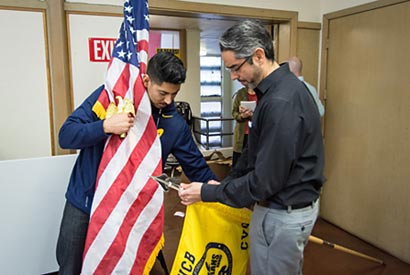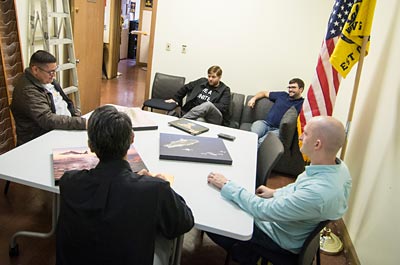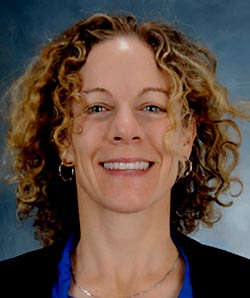Student-veterans cheer their first campus center
The number of veterans heading to college after service in Iraq and Afghanistan is increasing, but straining resources at many schools. At UC Berkeley, an alumnus and Army veteran has provided a gift that funds Cal Veteran Services' first home and expands services for student-vets here.
November 7, 2014
At a time when wars are winding down in Afghanistan and Iraq, UC Berkeley’s student-veterans program is expanding to accommodate an anticipated increase in the number of veterans expected to enroll here in the next five years.
On Monday (Nov. 10), just in time for Veterans Day, Cal Veteran Services will open a new headquarters in Stiles Hall as the result of a gift of more than $500,000 from UC Berkeley alumnus Coleman Fung, a U.S. Army veteran. The funding also provides a comprehensive network of services — an additional academic counselor, paid internships for student-veterans, peer mentoring, a new website and outreach and recruitment activities.
An open house will be held Monday, Nov. 10, from 5:30 to 7:30 p.m. at the center, in Stiles Hall at 2400 Bancroft Way. Before the event, a 5 p.m. flag-lowering ceremony will be held at the flagpole west of California Hall.

The new Cal Veteran Services center is readied for its Nov. 10 open house. (UC Berkeley photo by Kevin Ho Nguyen)
“Veterans enhance our campus community with their life experience and dedication to public service, which is a core value of UC Berkeley,” said Ron Williams, director of Re-entry Student and Veteran Services on campus. “Our program was being stretched thin, but this generous gift will enable us to help more veterans navigate to and through higher education.”
Williams added that the “transformative opportunities” offered by a university such as UC Berkeley will help student-veterans “continue to use their drive, work ethic and leadership to strengthen California and the nation.”
Fung, a 1987 Berkeley graduate who served in the Army from 1982 to 1985, said he’d like to see the program “become a model for other schools to adopt, with our student-vets serving as ambassadors to other veterans in the Bay Area who would welcome guidance about their educational options, especially about how to use their VA benefits, and how not to waste them on many for-profit programs.”
Currently, there are about 250 confirmed student-veterans at Berkeley, “and we know there are far more who either are not using their federal benefits, or who no longer have access to them,” said Williams. By 2019, he said, that number is expected to reach 500, as more returned veterans seek higher education and as Cal Veteran Services’ outreach increases.
An ‘absolutely essential’ home
A group of student-veterans recently unpacked the American, Cal Veteran Services and military flags at off-campus Stiles Hall to ready their second-floor space for Monday’s open house. They recalled their former meeting spot, which opened its doors in 2008 in the César Chavez Student Center, as two cramped, closet-sized offices where only three people at a time could comfortably fit.

Student-veterans and center leadership now have ample meeting space. (UC Berkeley photo by Kevin Ho Nguyen)
Now, they have five offices, a study space and shared areas large enough for them to study together, hold community meetings, meet privately with advisers and to “let my guard down, be myself,” said Thomas Wiltshire, a media studies major who was a combat cameraman in the Marines from 2005 to 2010. “I think many veterans would agree that oftentimes we are emotionally on guard because we have had experiences that are very distant from those of our classmates and, understandably, are misunderstood by them. This space allows us to take a break from self-censoring and just relax.”
Stiles Hall, at 2400 Bancroft Way near the heart of campus, will be the group’s temporary home, funded for two years by Fung’s gift, until a permanent, on-campus site is available.
John Ready, a Ph.D. candidate in nuclear engineering who served for five years in the Navy as a nuclear-trained surface warfare officer, earlier this year conducted the first-ever campus survey to assess the needs of student-veterans, many of them from underrepresented backgrounds and the first in their families to attend college.
President of the Graduate Assembly, Ready said his survey found that, like himself, many are “older, have kids, find it hard to connect to 18-year-olds. Some are unemployed or are in benefits disputes or have health issues — serious stuff like PTSD and traumatic brain injuries. In our country, 22 vets a day commit suicide. It’s important that we have a community on campus and a place to go.”
He said more than half of those who responded to the survey described a physical space to meet either as “a great need” or “absolutely essential.”
Mission of public service
Fung stressed important similarities between student-veterans and their UC Berkeley classmates — intelligence, drive and, he said, “a commitment to make America and the world a better place.”

Lt. Col. Nina D’Amato, UC Berkeley Ph.D. student (Photo by Chablis Torrence)
The program’s new home will provide a base for this mission. “What we’re creating is a step beyond a separate, isolated, exclusive space,” said Ready. “This will be a place to do outreach to student-vets at other schools, in the community and among Berkeley staff and alumni, about higher education and about Berkeley as a place for vets and where they can excel.”
Several outreach efforts already underway now will have a place to meet. Cal Veteran Services partners with Undergraduate Admissions in the Starting Point Mentorship Program, in which UC Berkeley student-veterans are matched with prospective student-veterans — whether local or on active duty — to guide them through the admissions process and to share information about campus services and opportunities.
Berkeley Law student-veterans offer legal services to Bay Area veterans, including those on campus. The Boalt Veteran Assistance Project provides advocacy, for example, for those who received dishonorable discharges as the result of the “Don’t ask, don’t tell” law, which prohibited gay and lesbian people from serving openly in the military. After the law was repealed in 2011, the advocates began assisting with discharge upgrades, so that veterans can become eligible for their military benefits.
Williams added that a program being developed by Haas School of Business MBA student-veterans will guide veterans in their business plans and can operate from the new center.
Lt. Col. Nina D’Amato, a UC Berkeley doctoral candidate in education and an active reservist in the Marine Corps, plans to launch the Cal Alumni Fellowship for Veterans by the 2015-16 school year. During her military service, she implemented in two war-torn provinces Afghanistan’s National Education Strategic Plan, which included opening 115 much-needed schools.
“Beyond physical and mental health support,” she said, “student-veterans need professional networks that will give them a pathway to a new identity and mentors at their level of experience to guide them.”
This fellowship “will open up an avenue to paid internships and matched mentoring at corporations in and around the Bay Area,” and in the areas of research, teaching and veterans services, she said.
Cal Veteran Services’ new digs, said D’Amato, “gives us a space for all this to take place.”
Related: A pictorial guide to UC Berkeley’s long military history.